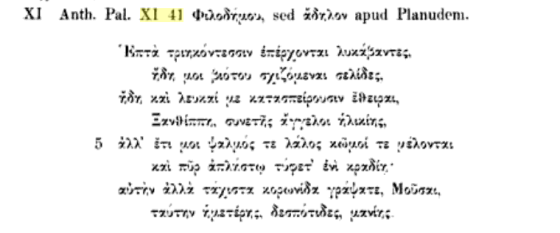Thirty seven years approaching
already ripped pages of my life
by this time white pieces of hair have grown,
Xanthippei *, discreet announcers of age
regadless, chattery psalms in the head are chanting
and a relentless fire is burning the heart-
but for this coronida** quickly write about, Muses,
this one, my rulers, overthrows your madness.
*Xanthippe was an ancient Athenian (of supposedly argumentative nature), the wife of pholosopher Socrates, and mother of their three sons: Lamprocles, Sophroniscus, and Menexenus.
**coronida (singular)-THE two KORONIDES (or Coronides) were two nymph daughters of the constellation-giant Orion. When the land of Boiotia (Boeotia) was struck by pestilence and drought they voluntarily offered themselves up as sacrifice to the gods, bashing out their own brains with shuttles. Persephone in pity then turned them into comets.
The name Koronides was associated with the Greek words korônis, “curving one” or “comet” and korônê “the shuttle” and “the crow.”
Original:

(AP XI.41)
By Philodemus 110-30BC.
(see Index scholarum in Universitate Litteraria Gryphiswaldensi
-Philodemus, Georg Kaibel)
Philodemus of Gadara (ca. 110–ca. 30 BC) “was an Epicurean philosopher and epigrammatist who, having studied in the Epicurean school …”http://plato.stanford.edu/entries/philodemus )


You must be logged in to post a comment.